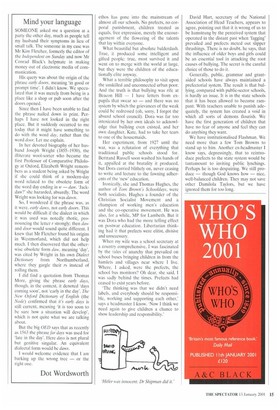Mind your language
SOMEONE asked me a question at a party the other day, much as people tell my husband their symptoms in lieu of small talk. The someone in my case was Mr Kim Fletcher, formerly the editor of the Independent on Sunday and now Mr Conrad Black's helpmate in making money out of electronic media of communication.
His query was about the origin of the phrase early doors, meaning 'in good or prompt time'. I didn't know. We speculated that it was merely from being in a place like a shop or pub soon after the doors opened.
Since then I have been unable to find the phrase nailed down in print. Perhaps I have not looked in the right place. But it suddenly occurred to me today that it might have something to do with the word day, rather than the word door. Let me explain.
In her devoted biography of her husband Joseph Wright (1855-1930), the illiterate wool-sorter who became the first Professor of Comparative Philology at Oxford, Elizabeth Wright remembers as a student being asked by Wright if she could think of a modern-day word related to the obsolete form of the word day ending in w — daw. 'Jackdaw?' she hazarded, absurdly. The word Wright was looking for was dawn.
So, I wondered if the phrase was, as it were, early daws, not early doors. This would he difficult if the dialect in which it was used was notedly rhotic, pronouncing the letter r strongly; then daw and door would sound quite different, I knew that Mr Fletcher found his origins in Westmorland, which did not help much. I then discovered that the otherwise obsolete form claw. meaning 'day', was cited by Wright in his own Dialect Dictionary from Northumberland, where they gargle their rs instead of rolling them.
did find a quotation from Thomas More, giving the phrase early days, though, in the context, it denoted 'days coming soon', not 'early in the day'. The New Oxford Dictionary of English (the Node) confirmed that it's early days is still current, meaning 'it is too soon to be sure how a situation will develop', which is not quite what we are talking about.
But the big OED says that as recently as 1563 the phrase far days was used for 'late in the day'. Here days is not plural hut genitive singular. An equivalent dialectal form would be daws.
I would welcome evidence that I am barking up the wrong tree — or the right one.
Dot Wordsworth






























































 Previous page
Previous page